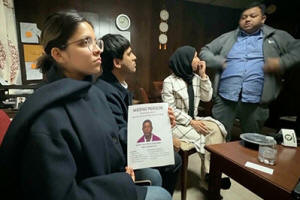Video shows nearly blind refugee being released by Border Patrol, 5 days
before his death
[February 28, 2026]
BUFFALO, N.Y. (AP) — In the moments after Border Patrol agents dropped
him off at a Buffalo doughnut shop, surveillance video recorded Nurul
Amin Shah Alam stepping gingerly through the empty parking lot in his
county-issued jail booties. He pulls up his hood against the cold as he
walks past a drive-thru window, then paces away into the night.
Five nights later, the nearly blind refugee from Myanmar was found dead
in the street, raising questions about whether federal agents could have
done more to ensure his safety when they released him from custody,
miles from his home, without informing his family or lawyer.
The video obtained by the Investigative Post shows Shah Alam, 56, after
agents dropped him off at a Tim Hortons on the night of Feb. 19, the day
he was released from a county jail where he had been held for a year.
Buffalo Mayor Sean Ryan has said the restaurant was closed at that time.
The nonprofit news site says the footage it obtained shows Shah Alam
being let out of the Border Patrol van, which can be seen driving away,
then walking by the restaurant's locked front door.
U.S. Customs and Border Protection said this week that agents chose “a
warm, safe location" for the drop off.
Shah Alam was found dead Tuesday outside the arena where the NHL’s
Buffalo Sabres play. A woman called 911 to report his body lying in the
sidewalk. It was unclear how he got to that downtown spot from the
restaurant several miles away. Buffalo police were reviewing footage
throughout the city in an attempt to identify his movements.
The county medical examiner was investigating the cause of death.
Customs and Border Protection said agents offered Shah Alam “a courtesy
ride” to a location near where his family had once lived, and that he
had accepted the ride and showed no signs of distress or disability. The
agency did not respond to an email seeking comment Friday.
A Legal Aid Bureau of Buffalo lawyer, Benjamin Macaluso, reported Shah
Alam missing Sunday.

By then, Shah Alam's family knew he had been released from jail but had
no idea of his whereabouts. Macaluso went to an area immigration
detention center, where he assumed Shah Alam had been taken, but he was
told he wasn't there. He visited hospitals and homeless shelters,
searched the neighborhood where the family lived previously, and
distributed missing persons posters around the area.
It wasn't until Monday that he learned, the Legal Aid Bureau said, that
Shah Alam had been dropped off at the Tim Hortons.
[to top of second column]
|

This image made from video provided by WKBW.COM shows a family
friend holding a missing person flyer for Nurul Amin Shah Alam,
while sitting with other family friends including Khaleda Shah,
second from right, and MD Karim, far right, on Wednesday, Feb. 25,
2026, in Buffalo, N.Y. (WKBW.COM via AP)

Buffalo Police had no updates Friday, but on Thursday released
body-camera footage of the 2025 incident that led to Shah Alam being
jailed for a year.
At the time, Shah Alam was newly arrived in Buffalo, the legal Aid
Bureau said. He hardly knew the neighborhood where the family lived,
spoke practically no English, was blind in one eye and had very
limited vision in the other.
In the videos, police approach Shah Alam in a snowy backyard as he
holds what appear to be two curtain rods. An approaching officer
shouts “What are you doing?” and “Put it down” multiple times. Shah
Alam, dressed in a hoodie, walks toward the officers, occasionally
holding out his hand.
Advocates for the family say Shah Alam wandered into the wrong
property when the police were called and did not understand the
officers’ commands because he did not speak English.
In the body camera videos, one officer says “I'm going to shoot you,
dude” before firing Tasers and then taking him to the ground in a
struggle and cuffing his hands behind his back. Police say Shah Alam
bit two officers.
Shah Alam was initially charged with felony assault, burglary and
criminal mischief. A federal immigration detainer was issued after
his arrest.
The Legal Aid Bureau said “a strategic decision” was made not to
post bail after his arrest over fears he would be taken into custody
by immigration officials. But lawyers advised Shah Alam’s family it
was safe to post bail after he pleaded guilty Feb. 9 to two lesser,
misdemeanor charges.
He was released from the Erie County Holding Center Feb. 19 after
posting bond. The county sheriff's office informed the U.S. Border
Patrol about his pending release because of the immigration
detainer.
He was dropped off at the Tim Hortons that night after federal
authorities determined he wasn't eligible for deportation.
All contents © copyright 2026 Associated Press. All rights reserved |